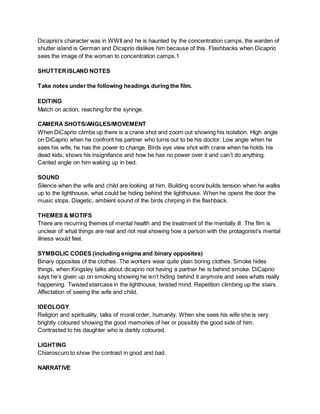Shutter island analysis
- 1. DicaprioŌĆÖs character was in WWII and he is haunted by the concentration camps, the warden of shutter island is German and Dicaprio dislikes him because of this. Flashbacks when Dicaprio sees the image of the woman to concentration camps.1 SHUTTERISLAND NOTES Take notes under the following headings during the film. EDITING Match on action, reaching for the syringe. CAMERA SHOTS/ANGLES/MOVEMENT When DiCaprio climbs up there is a crane shot and zoom out showing his isolation. High angle on DiCaprio when he confront his partner who turns out to be his doctor. Low angle when he sees his wife, he has the power to change. Birds eye view shot with crane when he holds his dead kids, shows his insignifance and how he has no power over it and canŌĆÖt do anything. Canted angle on him waking up in bed. SOUND Silence when the wife and child are looking at him. Building score builds tension when he walks up to the lighthouse, what could be hiding behind the lighthouse. When he opens the door the music stops. Diagetic, ambient sound of the birds chirping in the flashback. THEMES & MOTIFS There are recurring themes of mental health and the treatment of the mentally ill. The film is unclear of what things are real and not real showing how a person with the protagonistŌĆÖs mental illness would feel. SYMBOLIC CODES (including enigma and binary opposites) Binary opposites of the clothes. The workers wear quite plain boring clothes. Smoke hides things, when Kingsley talks about dicaprio not having a partner he is behind smoke. DiCaprio says heŌĆÖs given up on smoking showing he isnŌĆÖt hiding behind it anymore and sees whats really happening. Twisted staircase in the lighthouse, twisted mind. Repetition climbing up the stairs. Affectation of seeing the wife and child. IDEOLOGY Religion and spirituality, talks of moral order, humanity. When she sees his wife she is very brightly coloured showing the good memories of her or possibly the good side of him. Contrasted to his daughter who is darkly coloured. LIGHTING Chiaroscuro to show the contrast in good and bad. NARRATIVE
- 2. The film contains non-linear narrative. Flashbacks of the protagonistŌĆÖs family are used frequently throughout the film. In the film, the audience doesnŌĆÖt know what is real and what isnŌĆÖt so the film isnŌĆÖt clear about the order of the narrative. CHARACTERS REPRESENTATION Blur between reality and his mind. When the truth is revealed DiCaprioŌĆÖs clothes is changed from white to grey to present that he has converted to the ŌĆśdark sideŌĆÖ. SETTING & MISE-EN-SCENE Isolation, abandoned question what is hidden. Much walls in the hospital to hide what is really there. After the reveal, order is restored and things are bright and clean. MOOD & TONE The feel has an unsettling, mysterious tone. Foreshadowing: DicaprioŌĆÖs character asks for a lighter on the boat foreshadowing that he is a mental patient because he has to ask for a lighter. When DiCaprio is interviewing a patient he finishes her sentence. When the patient takes a drink from water there is a short shot of her without the glass showing that it is all in DiCaprioŌĆÖs head.

